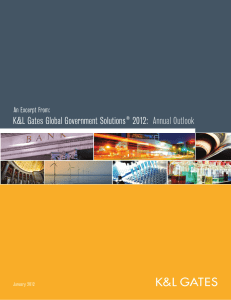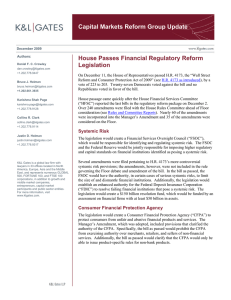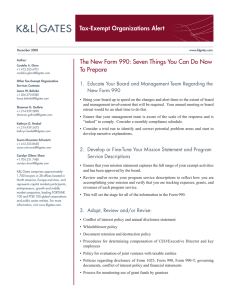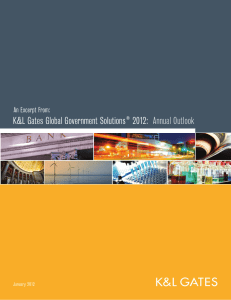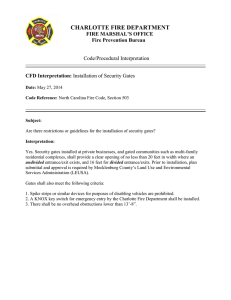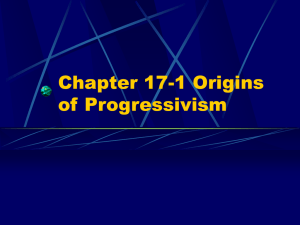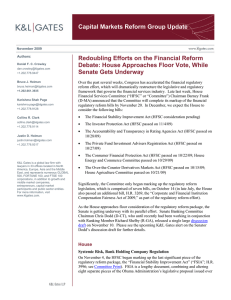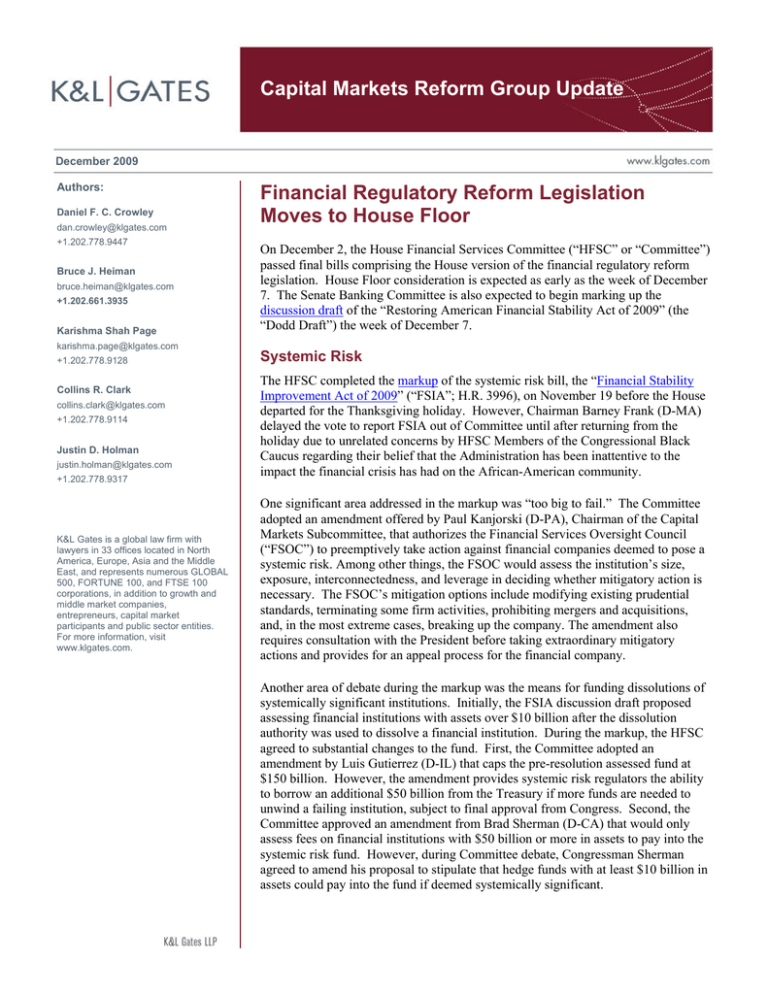
Capital Markets Reform Group Update
December 2009
Authors:
Daniel F. C. Crowley
dan.crowley@klgates.com
+1.202.778.9447
Bruce J. Heiman
bruce.heiman@klgates.com
+1.202.661.3935
Karishma Shah Page
karishma.page@klgates.com
+1.202.778.9128
Collins R. Clark
collins.clark@klgates.com
+1.202.778.9114
Justin D. Holman
justin.holman@klgates.com
+1.202.778.9317
K&L Gates is a global law firm with
lawyers in 33 offices located in North
America, Europe, Asia and the Middle
East, and represents numerous GLOBAL
500, FORTUNE 100, and FTSE 100
corporations, in addition to growth and
middle market companies,
entrepreneurs, capital market
participants and public sector entities.
For more information, visit
www.klgates.com.
Financial Regulatory Reform Legislation
Moves to House Floor
On December 2, the House Financial Services Committee (“HFSC” or “Committee”)
passed final bills comprising the House version of the financial regulatory reform
legislation. House Floor consideration is expected as early as the week of December
7. The Senate Banking Committee is also expected to begin marking up the
discussion draft of the “Restoring American Financial Stability Act of 2009” (the
“Dodd Draft”) the week of December 7.
Systemic Risk
The HFSC completed the markup of the systemic risk bill, the “Financial Stability
Improvement Act of 2009” (“FSIA”; H.R. 3996), on November 19 before the House
departed for the Thanksgiving holiday. However, Chairman Barney Frank (D-MA)
delayed the vote to report FSIA out of Committee until after returning from the
holiday due to unrelated concerns by HFSC Members of the Congressional Black
Caucus regarding their belief that the Administration has been inattentive to the
impact the financial crisis has had on the African-American community.
One significant area addressed in the markup was “too big to fail.” The Committee
adopted an amendment offered by Paul Kanjorski (D-PA), Chairman of the Capital
Markets Subcommittee, that authorizes the Financial Services Oversight Council
(“FSOC”) to preemptively take action against financial companies deemed to pose a
systemic risk. Among other things, the FSOC would assess the institution’s size,
exposure, interconnectedness, and leverage in deciding whether mitigatory action is
necessary. The FSOC’s mitigation options include modifying existing prudential
standards, terminating some firm activities, prohibiting mergers and acquisitions,
and, in the most extreme cases, breaking up the company. The amendment also
requires consultation with the President before taking extraordinary mitigatory
actions and provides for an appeal process for the financial company.
Another area of debate during the markup was the means for funding dissolutions of
systemically significant institutions. Initially, the FSIA discussion draft proposed
assessing financial institutions with assets over $10 billion after the dissolution
authority was used to dissolve a financial institution. During the markup, the HFSC
agreed to substantial changes to the fund. First, the Committee adopted an
amendment by Luis Gutierrez (D-IL) that caps the pre-resolution assessed fund at
$150 billion. However, the amendment provides systemic risk regulators the ability
to borrow an additional $50 billion from the Treasury if more funds are needed to
unwind a failing institution, subject to final approval from Congress. Second, the
Committee approved an amendment from Brad Sherman (D-CA) that would only
assess fees on financial institutions with $50 billion or more in assets to pay into the
systemic risk fund. However, during Committee debate, Congressman Sherman
agreed to amend his proposal to stipulate that hedge funds with at least $10 billion in
assets could pay into the fund if deemed systemically significant.
Capital Markets Reform Group Update
In the Senate, the Dodd Draft creates a resolution
fund for financial companies, funded by postresolution assessments imposed on financial
companies with more than $10 billion in total assets.
Federal Insurance Office
In addition to FSIA, the HFSC favorably reported
the “Federal Insurance Office Act of 2009”
(“FIOA”; Manager’s Amendment to H.R. 2609).
FIOA would create a new Office of National
Insurance at the Treasury Department, which will be
responsible for aggregating state insurance data. It
is likely the legislation is primarily a placeholder,
deferring significant insurance industry reforms until
the next Congress.
Looking Ahead
Now that the HFSC has completed its markup of the
regulatory reform bills, the legislation will be
readied for Floor consideration. HFSC Chairman
Frank has stated that the Committee-passed bills will
be modified prior to House consideration,
particularly with respect to FSIA and the Over-theCounter Derivatives Markets Act of 2009. In the
case of the Consumer Financial Protection Agency
Act of 2009 and the Over-the-Counter Derivatives
Markets Act of 2009, there were two committees
that reported versions of the legislation. The House
Rules Committee will determine the process by
which the versions of each bill will be considered.
Additionally, the Rules Committee will merge the
bills comprising the regulatory reform package into
a single bill. In addition, it is likely that the Rules
Committee will allow a limited number of
amendments to be offered for consideration. Full
House consideration is expected as early as the
week of December 7.
In the Senate, the Banking Committee heard
opening statements on November 19 and is
expected to begin marking up legislation the week
of December 7. The markup is expected to take
several weeks. Because the health care debate, in
which Chairman Dodd still has a hand, is likely to
go up to the Christmas holiday and possibly into
next year, Senate Floor consideration of the
financial regulatory reform package is not expected
until next year.
Please see previous K&L Gates updates, including
Senator Dodd Releases Financial Reform Proposal:
The Restoring American Financial Stability Act of
2009 and Redoubling Efforts on the Financial
Reform Debate: House Approaches Floor Vote,
While Senate Gets Underway, for additional
information about the reform effort. In addition,
please see the K&L Gates Global Financial Market
Watch Blog for detailed analysis on many of the
Obama proposals and future updates.
Anchorage Austin Beijing Berlin Boston Charlotte Chicago Dallas Dubai Fort Worth Frankfurt Harrisburg Hong Kong London
Los Angeles Miami Newark New York Orange County Palo Alto Paris Pittsburgh Portland Raleigh Research Triangle Park
San Diego San Francisco Seattle Shanghai Singapore Spokane/Coeur d’Alene Taipei Washington, D.C.
K&L Gates is a global law firm with lawyers in 33 offices located in North America, Europe, Asia and the Middle East, and represents numerous
GLOBAL 500, FORTUNE 100, and FTSE 100 corporations, in addition to growth and middle market companies, entrepreneurs, capital market
participants and public sector entities. For more information, visit www.klgates.com.
K&L Gates comprises multiple affiliated partnerships: a limited liability partnership with the full name K&L Gates LLP qualified in Delaware and
maintaining offices throughout the United States, in Berlin and Frankfurt, Germany, in Beijing (K&L Gates LLP Beijing Representative Office), in
Dubai, U.A.E., in Shanghai (K&L Gates LLP Shanghai Representative Office), and in Singapore; a limited liability partnership (also named K&L
Gates LLP) incorporated in England and maintaining offices in London and Paris; a Taiwan general partnership (K&L Gates) maintaining an office in
Taipei; and a Hong Kong general partnership (K&L Gates, Solicitors) maintaining an office in Hong Kong. K&L Gates maintains appropriate
registrations in the jurisdictions in which its offices are located. A list of the partners in each entity is available for inspection at any K&L Gates office.
This publication is for informational purposes and does not contain or convey legal advice. The information herein should not be used or relied upon
in regard to any particular facts or circumstances without first consulting a lawyer.
©2009 K&L Gates LLP. All Rights Reserved.
December 2009
2


